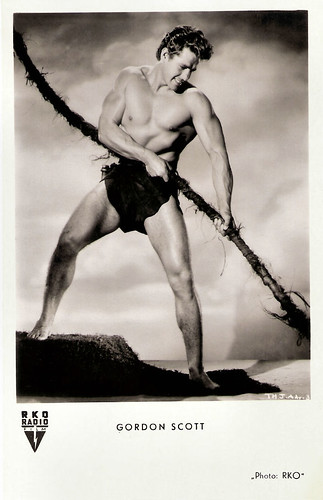
German postcard by Kunst und Bild, no. I 411. Photo: RKO. Publicity still for Tarzan's Hidden Jungle (Harold D. Schuster, 1955).

Italian 'vera fotografia' (real photo) postcard, no. 401. Gordon Scott as Tarzan.
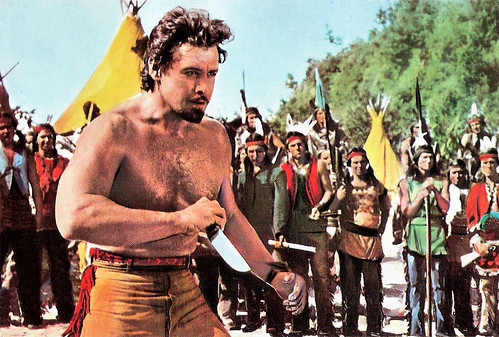
German collectors card by J & M Serienbilder Produktion Saar, no. 68. Photo: Gloria Film. Publicity still for Buffalo Bill, l'eroe del far west/Buffalo Bill, Hero of the Far West (Mario Costa, 1965). Caption: "In einem Zweikampf auf Leben und Tod hat Buffalo Bill, der berühmteste Held des Wilden Westens, seinen gefährlichsten Feind bezwungen. Der edle Kämpfer schenkt seinem Gegner das Leben. Die Indianer selbst sollen seine Strafe bestimmen." (In a duel to the death, Buffalo Bill, the famous hero of the Wild West, has defeated his most dangerous enemy. The noble warrior gives his opponent his life. The Indians themselves have to determine his punishment.)
Handsome features, muscular physique, and imposing height
Gordon Scott was born Gordon Merrill Werschkul in Portland, Oregon, in 1926. He was one of nine children of advertising man Stanley Werschkul and his wife Alice. He was raised in Oregon and studied Physical Education at the University of Oregon for one semester.
Upon leaving school, he joined the U.S. Army in 1944. He served as a drill sergeant and military policeman and specialised in close-order drill, judo and hand-to-hand combat. After his honourable discharge in 1947, he took on a variety of jobs, including fireman, cowboy, and farm-machinery salesman. In 1953 he was working as a lifeguard at the Sahara Hotel in Las Vegas when he was spotted by Hollywood agents, Ed and Walter Mayers. They were impressed by his handsome features, muscular physique, and imposing height.
Scott then beat out 200 contestants to replace Lex Barker as Edgar Rice Burroughs' famous jungle hero Tarzan. Film producer Sol Lesser offered him a 7-year contract, a loincloth and a new last name. Reportedly, ‘Werschkul’ sounded too much like ‘Weissmuller’. Renamed Gordon Scott, he debuted in the low-budget Tarzan’s Hidden Jungle (Harold D. Schuster, 1955).
It led to a romance with co-star Vera Miles, who became his wife in 1956. They divorced in 1959. Tarzan’s Hidden Jungle was followed by Tarzan and the Lost Safari (H. Bruce Humberstone, 1957), the first Tarzan film in colour. It was filmed in Nairobi, British East Africa. In his early Tarzan films, Scott played the character as unworldly and inarticulate, in the mould of Johnny Weissmuller.
In 1958, Sol Lesser sold Scott's contract to Sy Weintraub. The new producer took his star to Paramount Pictures and, fueled by bigger production budgets, made two of the most successful Tarzan films, Tarzan's Greatest Adventure (John Guillermin, 1959) with Anthony Quayle and Sean Connery, and Tarzan the Magnificent (Robert Day, 1960) with Jock Mahoney. In these later films, Scott played a Tarzan who was educated and spoke perfect English, as in the original Edgar Rice Burroughs novels. Gordon Scott was the only actor to play Tarzan in both styles.
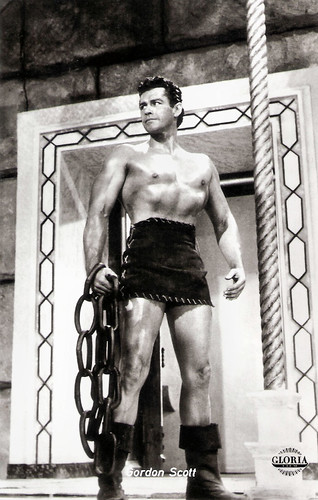
German postcard by Kolibri/Friedrich W. Sander-Verlag, Minden/Westf., no. 2322. Photo: Gloria Film. Publicity still for Maciste contro il vampiro/Maciste Vs. the Vampire (Giacomo Gentilomo, 1961).
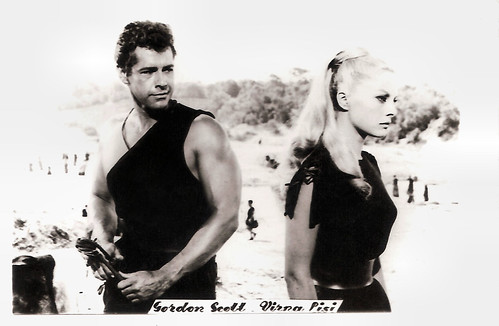
Small Romanian collectors card. Photo: Gordon Scott and Virna Lisi in Romolo e Remo/Duel of the Titans (Sergio Corbucci, 1961).
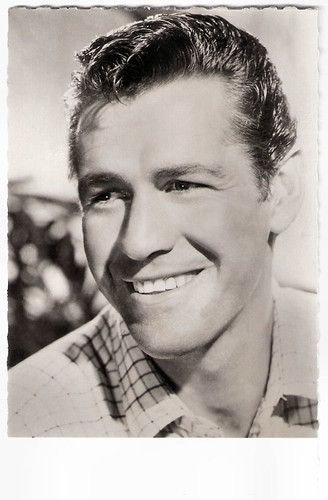
Vintage postcard.
Sword-and-sandal epics
Fearing he would become typecast as Tarzan, Gordon Scott moved to Italy. There he became a popular star of the Peplum genre, the sword-and-sandal epics featuring handsome bodybuilders as various characters from Greek and Roman myth.
Scott was an old training buddy of Hercules star Steve Reeves. Reeves had agreed to star in the Sergio Leone-penned saga Romolo e Remo/Duel of the Titans (Sergio Corbucci, 1961) about the two brothers of Roman Mythology, who founded Rome. The producer wanted Reeves to play both Romulus and Remus, but Reeves objected that the film would be more effective with another actor in the role of Remus. He recommended Gordon Scott, and the film co-starred Virna Lisi, Laura Solari, Massimo Girotti and Jacques Sernas. Scott was given the highest salary he had earned thus far for taking the role.
Next followed Maciste alla corte del Gran Khan/Maciste at the Court of the Great Khan (Riccardo Freda, 1961), which re-used the sets, extras and Yoko Tani as a princess from Marco Polo (Piero Pierotti, Hugo Fregonese, 1961) and Freda's I mongoli/The Mongols (André De Toth, Leopoldo Savona, Riccardo Freda, 1961).
Scott played Julius Caesar opposite Pascale Petit as Cleopatra in the historical drama Una regina per Cesare/A Queen for Caesar (Piero Pierotti, Victor Tourjansky, 1962) set in Egypt in 48 BC. Unlike other films about Caesar and Cleopatra, this film focuses entirely on the dynastic struggle within Egypt leading up to the arrival of Caesar, and in fact, we only see him in the closing scene of the film when he arrives at The Ptolemaic Palace in Alexandria. 20th Century Fox bought the rights for the film to keep it out of release lest it competed with their own Cleopatra, featuring Elizabeth Taylor. Scott also played Hercules in a couple of international co-productions during the mid-1960s.
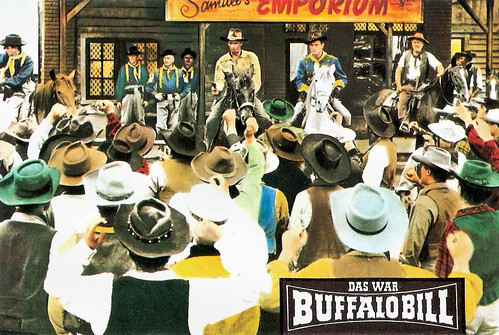
German collectors card by J & M Serienbilder Produktion Saar, no. 34. Photo: Gloria Film. Publicity still for Buffalo Bill, l'eroe del far west/Buffalo Bill, Hero of the Far West (Mario Costa, 1965) with Gordon Douglas. Caption: "Buffalo Bill hat sich auf die Fährte des weissen Waffenhändlers gesetzt, der die Rothäute zum Kampf aufwiegelt. Furchtlos hält Bill eine Übermacht rauher Burschen in Schach." (Buffalo Bill has set himself at the trail of the white arms dealer who incites the redskins to fight. Fearless Bill holds a a superior force of rough boys at bay.)

German collectors card by J & M Serienbilder Produktion Saar, no. 35. Photo: Gloria Film. Publicity still for Buffalo Bill, l'eroe del far west/Buffalo Bill, Hero of the Far West (Mario Costa, 1965) with Gordon Douglas. Caption: "Buffalo Bill, der Held des Wilden Westens ohne Furcht und Tadel, fürchtete selbst die gefährlichtsen Gegner nicht. Er ist entschlossen den illegalen Waffenhändlern das Handwerk zu legen." (Buffalo Bill, the hero of the Wild West without fear and without reproach, did not fear even the most dangerous opponent. He is determined to put down the business of the illegal arms dealers.)
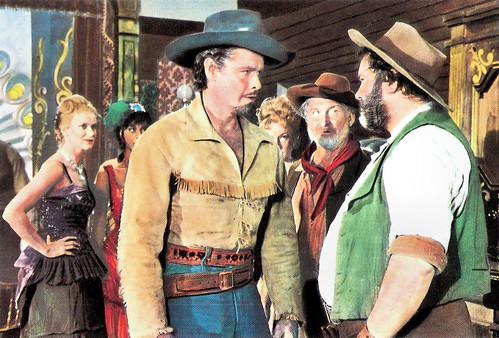
German collectors card by J & M Serienbilder Produktion Saar, no. 43. Photo: Gloria Film. Publicity still for Buffalo Bill, l'eroe del far west/Buffalo Bill, Hero of the Far West (Mario Costa, 1965) with Gordon Douglas. Caption: "Buffalo Bill begibt sich mit seinem Gefährten in die Höhle des Löwen. Als harmloser Gast horcht er in der Bar des Dunkelmannes Monroe herum, um zu erfahren wo die entführte Häuptlingstochter 'Mondstrahl' gefangen gehalten wird." (Buffalo Bill embarks with his companions in the lion's den. As harmless guest he listens around in the bar of the dark man Monroe to find out where 'Moonbeam', the chief's kidnapped daughter, is being held captive.)
Buffalo Bill
As the Peplum genre faded, Gordon Scott starred in other genre films. His first Spaghetti Western was Buffalo Bill, l'eroe del far west/Buffalo Bill, Hero of the Far West (Mario Costa, 1964) with Jan Hendriks.
He also starred in the Eurospy film Il Raggio infernale/Danger!! Death Ray (Gianfranco Baldanello, 1967). It was released at a time when the James Bond films, and spy films in general, were very popular internationally. His early military combat and martial arts training made it possible for him to do many of his own stunts.
His final film appearance was in the Spaghetti Western Gli uomini dal passo pesante/The Tramplers (Albert Band, Mario Sequi, 1966-1968) with Joseph Cotten and Franco Nero. He left Italy and never made another film. He was trailed by a reputation as a ladies' man who seldom paid his bills, according to a 1987 article in the Toronto Star. For the last two decades of his life, Scott was a popular guest at film conventions and autograph shows and sold knives.
In 2007, Gordon Scott died, aged 80, in Baltimore, Maryland, of lingering complications from multiple heart surgeries earlier in the year. Adam Bernstein in his obituary in The Washington Post: “He lived with a series of obliging friends and ‘Tarzan’ fans, most recently in Baltimore. He had a troubled marriage with Miles, who apparently was under the impression that she was his first wife. She was his second or third, by varying accounts. He was seldom in contact with his surviving family, which includes a brother and two sisters. He had a son with Miles, and it's unclear how many other children he might have had. He was estranged from nearly everyone.”
Scott was married three times. His first marriage was with Janice Mae Wynkoop, of Oakland, California. They met when he was a lifeguard at Lake Temescal, located in Oakland, California. The couple married in Reno, Nevada, in 1948, and had one child, Karen Judith Werschkul (1948), before divorcing in 1949. His second marriage was to a woman he met while they were both working at the Sahara Hotel in Las Vegas. Gordon as a lifeguard and his wife as a PBX operator. They soon married and had a son, Eric, but the marriage ended once Gordon's acting career took off. With Vera Miles, he had one son, Michael (1957).
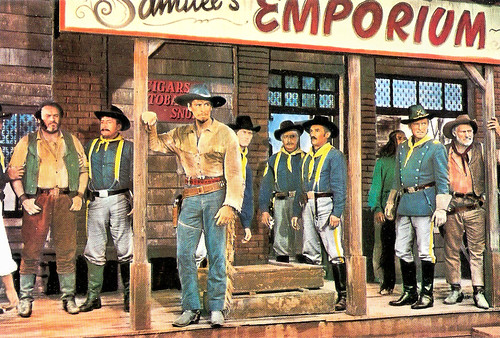
German collectors card by J & M Serienbilder Produktion Saar, no. 46. Photo: Gloria Film. Publicity still for Buffalo Bill, l'eroe del far west/Buffalo Bill, Hero of the Far West (Mario Costa, 1965). Caption: "Der erste Schurke, Big Sam, ist gefasst. Buffalo Bill hat bei ihm die Schiesseisen für die Rothäute gefunden. Big Sam gehört zu den Banditen, auf deren Konto die neunen Kämpfe zwischen Sioux und Weissen kommen." (The first villain, Big Sam is taken. Buffalo Bill has found at his place the firearms for the Redskins. Big Sam is one of the bandits, on whose account comes the new fighting between Sioux and whites.)
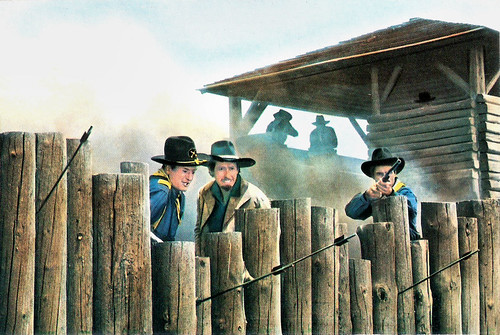
German collectors card by J & M Serienbilder Produktion Saar, no. 51. Photo: Gloria Film. Publicity still for Buffalo Bill, l'eroe del far west/Buffalo Bill, Hero of the Far West (Mario Costa, 1965) with Gordon Douglas. Caption: "'Gelbe Hand' vom Stamm der Sioux sieht seine hinterhältigen Manöver durchschaut. Er holt zum letzten Schlag gegen Fort Adam aus. Die von einem weissen Verräter gelieferten Feuerwaffen, den Buffalo Bill erledigt hat, sollen den Rothäuten den Sieg erkämpfen." ('Yellow Hand' of the tribe of Sioux sees his sneaky maneuver comprehended. He brings out the final blow to Fort Adam. The firearms, delivered by a white traitor, who Buffalo Bill has done in, have to help the Redskins to a victory.)
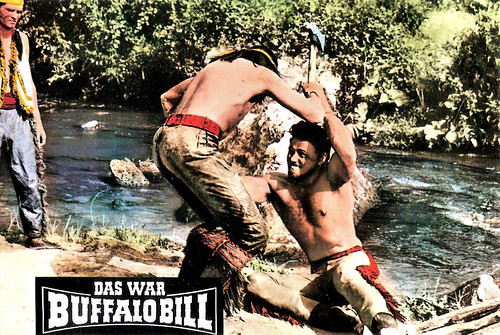
German collectors card by J & M Serienbilder Produktion Saar, no. 67. Photo: Gloria Film. Publicity still for Buffalo Bill, l'eroe del far west/Buffalo Bill, Hero of the Far West (Mario Costa, 1965) with Mirko Ellis and Gordon Scott (at right). Caption: "Wieder beweist der feige Häuptling Gelbe Hand'' im atemberaubenden Zweikampf mit Buffalo Bill seine Heimtücke. Er schmettert den Tomahawk auf den waffenlosen Gegner und deshalb verachten ihn jetzt sogar die eigenen Stammesgenossen." (Again the cowardly chief Yellow Hand hows his maliciousness in a breathtaking duel with Buffalo Bill. He smashes the Tomahawk on his unarmed opponent and therefore even his own tribesmen now despise him.)
Sources: Adam Bernstein (The Washington Post), Brian J. Walker (Brian’s Drive-In Theater), Bill Hillman (ERBzine), Mark Cerulli (Tarzan.cc), Wikipedia, and IMDb.
No comments:
Post a Comment